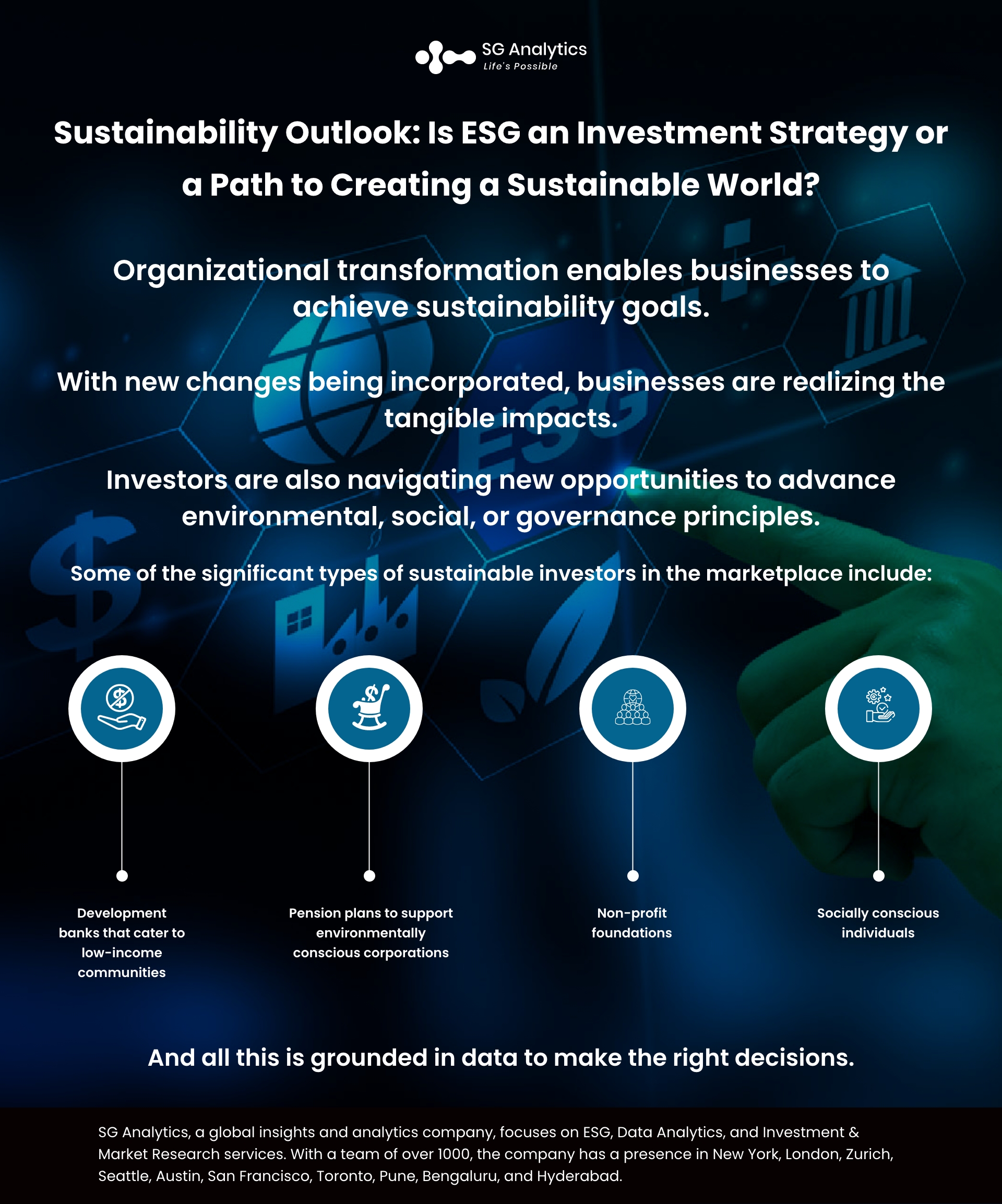Sustainability is headlining every new day, and organizations are slowly easing up to integrating environmental, social, and governance (ESG) factors into their business decisions.
ESG is extremely important to almost 87% of senior leadership and 74% of senior management. CEOs are now examining internal procedures, while asset owners are requesting better visibility on ESG reporting from the underlying companies they invest in. Microsoft’s Bill Gates, in a CNBC interview, stated that businesses who exaggerate their ESG credentials asserted that even though corporate sustainability credentials are controversial, they are vital to assess whether to invest in a company.
A KMPG survey also reported that global CEOS are placing ESG goals on hold to prepare for the looming recession. The report stated that while organizations are committed to investing in transformational opportunities for future growth, they will pause or reconsider their ESG efforts in 2023.
Read more: How are Impact Investors Tackling the New Opportunities in Climate Investment?
Due to several issues, ESG has experienced its share of negative limelight, but the definitions of ESG vary from industry to industry. For some, it can involve a lack of standards or measurement models; for others, it may be related to marketing hype and, in some cases, political pushback. As per the latest EY Outlook Report, 34% of the CEOS in their survey voiced that the impact of the climate crisis, as well as the pressure to build a sustainable framework, is the most significant risk for business growth.

With the rise of new regulatory requirements issued by governments, organizations are incorporating new measures to report their data faster and more accurately. And this trend is set to grow in importance, especially against the current recessionary economic environment.
Role of Technology
The path to sustainability for many sectors is through technology. In this sense, the tech sector has an excessive role to play in assisting all other industries with their ESG tracking and measurement and with effective change.
The recent KPMG report highlighted that despite the pause due to the global pandemic, supply chain disruption, and looming recession, the use case for ESG is still positive. The same report also indicated that almost 70% of the global CEOs believe that their company’s ESG programs helped in enhancing their financial performance.
Overall sustainability progress is being aided by technologies such as IoT, edge computing, digital twinning, blockchain, and other software architecture that are enabling organizations to identify and regulate end-to-end emission flows across their operational networks.
Many other technology applications, along with the quality and consistency of the inputs, help decide the quality and usefulness of the expected outputs. In addition to adopting new technologies, organizations should also work towards improving their data quality and management controls as well as operational processes.
Organizations are finally realizing their ESG agenda, as they can employ effective measures to act on the gathered data. Many organizations are employing technologies that assist them in tracking insights on their use of electricity. But it is not until they execute energy efficiency measures or renewable energy strategies to achieve the associated carbon reductions.
Read more: Sustainability Outlook: Top Emerging Trends in 2023 and Beyond

The Transition Equation
In this era of digital transformation, two categories of technologies are effective in advancing environmental ESG initiatives and impact. One is a set of upgraded technologies that are enabling organizations to deploy as well as implement measures to manage and track their ESG programs, and the other is a set of tools that are helping them to deliver on their environmental objectives.
The bottom line is to implement tools that assist in managing better ESG policies, thereby reducing risk and increasing velocity, along with reliability and traceability. With this rise in regulatory requirements, organizations across industries are incorporating practices to report their emission data faster and more accurately. And for many organizations, pursuing their environmental gains leads to a positive financial impact.
While companies are still developing effective processes to manage sustainability performance, many are embarking on this critical mission for two major reasons:
Organizations cannot achieve sustainability goals if the employees are not clear about the priorities and ways to achieve them.
-
Employees are voicing their opinion on careers that are more rewarding when even they are contributing to making a difference.
-
By realizing ESG goals using technology, corporations can stay competitive. This implies that enforcing these technologies is enabling them to reduce their carbon footprints along with reducing costs in the short- and long-term.

Values-Based Sustainable Investments
Sustainable investing is possible in many forms. Whether it is purchasing stock in a company that manufactures solar panels or biofuel or organizations in a community loan fund, there are various methods of sustainable investing. Many funds available are taking on the challenge of offering diverse choices to investors looking for sustainable investing practices. The core ideas and principles lie in identifying funds and financial institutions that understand the importance of ESG principles in society. Many contributors are now putting pressure on asset management firms to comply with ESG investing standards.
Investors are now exploring opportunities to trade exchange funds or ETFs, and securities that hold to such ideals. They are often motivated by the ethical drive to contribute financially to transition towards building a more sustainable and ethical future for all.
Read more: Sustainability in Tech: 3 Ways for Companies to Become More Sustainable
At the core lies the vision to use money to bring about social changes in society. Investors are now navigating new opportunities to advance environmental, social, or governance principles as they see the positive change due to ESG initiatives. Some of the significant types of sustainable investors in the marketplace include:
-
Development banks that cater to low-income communities
-
Pension plans to support environmentally conscious corporations
-
Non-profit foundations
-
Socially conscious individuals

Sustainable Goals Fostering Business Transformations
ESG frameworks and practices are evolving to help large companies as well as startups to better measure and visualize their impact on environmental and social issues. It is also assisting them in aligning their ESG values and reallocating resources to ramp up their efforts.
But the market is focused on corporates with effective resources, thus making it challenging for startups to track the same ESG metrics. However, the focus is now shifting to startups, as they are participating in the ongoing discussions for ESG. Statistically, 68% of startups voiced their opinions that ESG should be embedded into every business strategy.
And startups are at a unique advantage. They are smaller and more agile, making it easier for them to embed ESG practices into the company’s DNA from the beginning. By establishing ESG as a core value, startups are avoiding the additional cost along with internal restructuring. This contributes to their growth and success.

Key Takeaways:
-
ESG measures are being used to evaluate companies and their stocks in key areas.
-
ESG investing plays a major role in every decision-making when it comes to investment.
-
Sustainable Investing incorporates three primary areas – environmental, social, and governance.
-
With sustainability-focused investments on the rise, investors are voicing insight-backed reports to advance environmental, social, or governance principles and to bring in positive change.
-
Sustainable investing can be classified in many forms, such as stock purchases of eco-friendly companies or investing in nonprofit formation.
Read more: Sustainability Data Strategy: Top Key Components for a Positive Impact

To Sum Up
The prospect of organizational transformation is enabling businesses to achieve sustainability goals. With new changes being incorporated and implemented in steps, businesses are realizing the tangible impacts.
With ethics becoming an increasingly relevant topic in the world of business, organizations are exploring new ways to conduct themselves as global players with increasing importance. Unethical practices are often met with negative media attention and can be a major cause of consumer and investor uproar.
Sustainable policies and principles are attracting investors as they see the positive influence of their investments on the marketplace.
With a presence in New York, San Francisco, Austin, Seattle, Toronto, London, Zurich, Pune, Bengaluru, and Hyderabad, SG Analytics, a pioneer in Research and Analytics, offers tailor-made services to enterprises worldwide.
A leader in ESG Services, SG Analytics offers bespoke sustainability consulting services and research support for informed decision-making. Contact us today if you are in search of an efficient ESG integration and management solution provider to boost your sustainable performance.









